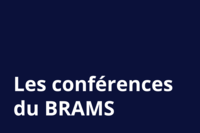Groove and Trance: Rhythmic Sound to Move the Body and Alter Consciousness
DR. MICHAEL HOVE, FITCHBURG STATE UNIVERSITY
Wednesday, March 8th, 2023, from 3:00 to 4:30 p.m., followed by a cocktail.
Université de Montréal, Pavilion Marie-Victorin, Room D-427
- Université de Montréal, Pavilion Marie-Victorin, Room D-427 : Please register via the Doodle link.
- The lecture will also be available via Zoom. No registration is required. Meeting ID: 833 0446 9411 Passcode: 871329
- The lecture will also be streaming live on Facebook.
- Please note that the conference will not be recorded
Abstract: Repetitive rhythmic sound can induce body movement and alter states of consciousness. In the first part of this talk, I’ll discuss movement to music and the musical features associated with body movement. I will present studies that establish links between movement and bass, and discuss mechanisms underlying these links such as the auditory and vibrotactile encoding of bass. I’ll conclude this section with applications of bass to boost social connection and mitigate hearing loss. In the second part of this talk, I’ll discuss the use of repetitive drumming to induce altered states of consciousness and trance. Rhythm-induced trance is commonly practiced in shamanism, humanity’s most ancient spiritual and healing tradition. Here I present fMRI and EEG studies of trance in experienced shamanic practitioners. Results show that during rhythmic-induced trance, the brain undergoes a network reconfiguration consistent with perceptual decoupling and that the repetitive drumming was largely gated out in order to maintain an internally oriented stream of consciousness. This work helps explain the common use of drumming to alter consciousness and why trance is a valuable tool to facilitate insight across cultures.
Bio: Michael Hove is an Associate Professor of Psychology at Fitchburg State University in Massachusetts and in Spring 2023 the Fulbright Research Chair in Brain, Language, and Music at McGill. He received a PhD in Psychology from Cornell University and held previous research positions at the Max Planck Institute for Cognitive and Brain Sciences, McMaster’s Institute for Music & the Mind, and Harvard University. Dr. Hove’s research uses behavioral, physiological, and cognitive-neuroscience tools to investigate rhythm and timing. His work has examined the neural underpinnings and musical attributes of musical groove, how people move along with the beat, and how rhythmic movement can increase social connection and induce altered states of consciousness. His work appears in journals including Current Biology, Music Perception, NeuroImage, Cerebral Cortex, and PNAS.
